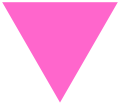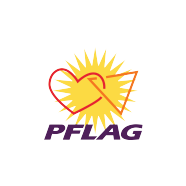Terms from GLBT History
The following terms have their roots in GLBT history.
Stonewall: The Stonewall Inn tavern in New York City’s Greenwich Village was the site of several nights of raucous protests after a police raid on June 28, 1969. Although not the nation’s first gay civil rights demonstration, Stonewall is now regarded as the birth of the modern gay civil rights movement.
 Pink Triangle: Now a gay pride symbol, it was the symbol gay men were required to wear in Nazi concentration camps during World War II. Lesbians sometimes also use a black triangle.
Pink Triangle: Now a gay pride symbol, it was the symbol gay men were required to wear in Nazi concentration camps during World War II. Lesbians sometimes also use a black triangle.
 Rainbow Flag: A flag of six equal horizontal stripes (red, orange, yellow, green, blue, and violet) signifying the diversity of the lesbian, gay, bisexual and transgender communities. (Note: The original rainbow flag had eight colored stripes, but it was later shortened to just six stripes.)
Rainbow Flag: A flag of six equal horizontal stripes (red, orange, yellow, green, blue, and violet) signifying the diversity of the lesbian, gay, bisexual and transgender communities. (Note: The original rainbow flag had eight colored stripes, but it was later shortened to just six stripes.)
Don’t Ask, Don’t Tell: Shorthand for “Don’t Ask, Don’t Tell, Don’t Pursue,” the military policy on gay men, lesbians and bisexuals. Under the policy, instituted in 1993, the military was not to ask service members about their sexual orientation, service members were not to tell others about their orientation, and the military was not to pursue rumors about members’ sexual orientation. The shorthand was acceptable in headlines, but in text the full phrase adds important balance. The Don’t Ask, Don’t Tell policy officially ended September 20, 2011.
Other Terms
Fag, Faggot: Originally a pejorative term for a gay male, it is now being reclaimed by some gay men. Caution: still extremely offensive when used as an epithet. It is still a slur in many contexts and is generally prohibited in schools with anti-harassment policies.
Homo; Pejorative term for homosexual. Avoid.
Queen: Originally a pejorative term for an effeminate gay man. Still considered offensive when used as an epithet.
Dyke: Pejorative term for a lesbian. Some young women self-identify as dykes, but it is still a slur in many contexts and is generally prohibited in schools with anti-harassment policies.
Sissy: Pejorative term for a gay man or a man who doesn’t fit masculine gender role stereotypes. As unacceptable at school as racial or religious slurs.
HIV: Human Immunodeficiency Virus: The virus that causes AIDS. “HIV virus” is redundant. “HIV-positive” means being infected with HIV but not necessarily having AIDS. AIDS doctors and researchers are using the term “HIV disease” more because there are other types of acquired immune deficiencies caused by toxins and rare but deadly diseases that are unrelated to what we now call AIDS.
AIDS: Acquired Immune Deficiency Syndrome: A medical condition that compromises the human immune system, leaving the body defenseless against opportunistic infections. Some medical treatments can slow the rate at which the immune system is weakened. Do not use the term “full-blown AIDS.” Individuals may be HIV-positive but not have AIDS. Avoid “AIDS sufferer” and “AIDS victim.” Use “people with AIDS” or, if the context is medical, “AIDS patients.”
Wait! Just when we thought we had a handle on all this terminology, wouldn’t you know that evolution marches forward, and new terminology (and new uses for some old terminology) continues to emerge. We suggest reading the article “The Origins and Continuing Evolution of Identity Terminology” which discusses where all this terminology originated (it’s waaaaay more recent that you may think) and how it is morphing once again — primarily by our younger generations. Want to be ahead of the curve? Read this article.
